Volcanoes are erupting in The Philippines, but on-fire Australia received some welcome rain. The Iran war cries have been called off and The Donald’s military powers are about to be hamstrung by the Senate. Meanwhile, his impeachment trial is starting, and we’re all on Twitter for a front-row seat.
What Could Go Right? The Best News of 2024 – United States Edition
A collection of the progress that occurred in the United States this year
This is our weekly newsletter, What Could Go Right? Sign up here to receive it in your inbox every Thursday at 5am ET. You can read past issues here.
Do you listen to the What Could Go Right? podcast? If so, we would love to hear from you! Take a few minutes to fill out our feedback survey, and be entered to win a collection of books by our founder, Zachary Karabell.
The Best US-Based News of 2024
Many Americans will remember 2024, for better or for worse, as the year that President-elect Donald Trump was voted back into the White House. A second Trump administration will undoubtedly reshape the United States and, to no small degree, the world.
Trump’s reelection is far from the only thing that happened this year in the US, however. National news predominates in the media so much that it is labor-intensive and difficult to track state-by-state action in a comprehensive way. But we have done our best to collect as much progress as we could find for 2024, both at the national and state levels. (Please note that this sometimes includes data gathered for 2023 and published this year.) Many of these trends defy partisan categorization and have been building for decades.
Make sure you open our newsletter next week as well, when we’ll share our global progress roundup for the year.
Health
Abortion and contraceptive rights: Arizona, Colorado, Maryland, Missouri, Montana, and New York enshrined the right to an abortion in their constitutions during the November elections. Nevada did as well, but it requires a second vote in 2026 to become official.
The vote in Missouri should lift a ban, perhaps this week, that had been active there since the Supreme Court overturned Roe v. Wade, leaving a total of 12 states with abortion bans. A judge in Missouri is currently considering arguments about whether to leave any restrictions on abortion, like a 72-hour waiting period, in place.
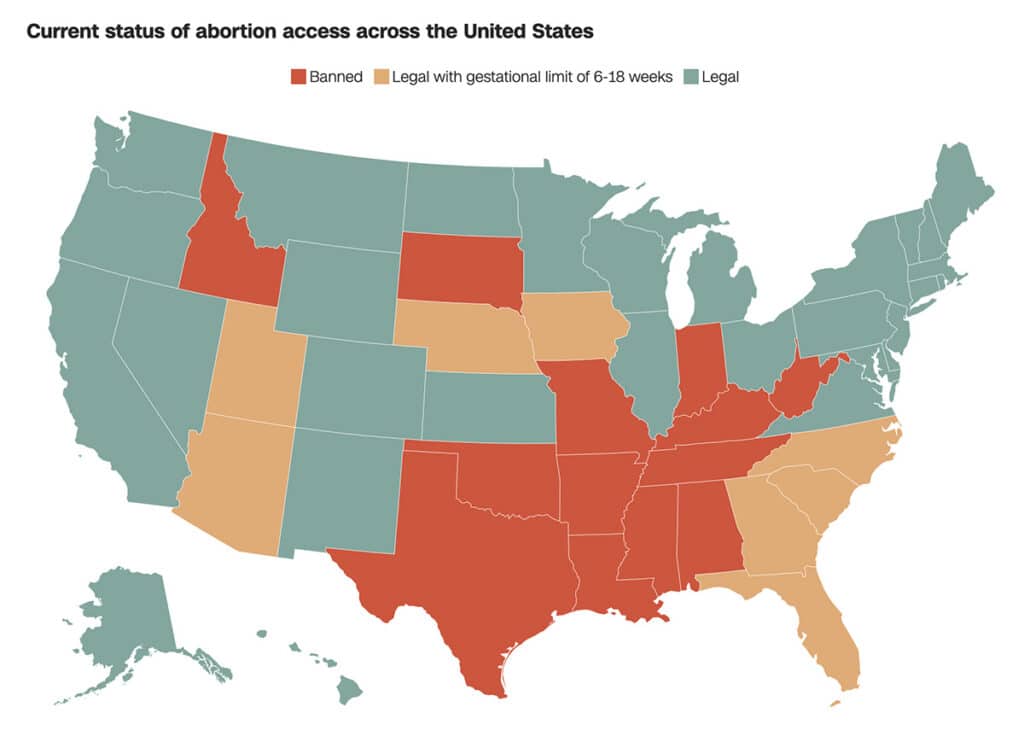
In June, the Supreme Court declined to hear a case that could have limited access to the abortion pill mifepristone. And in March, the country’s first over-the-counter birth control pill, Opill, became available to purchase in pharmacies as well as online.
Overdose deaths down: After spiking during the pandemic, overdose deaths appear to be in sustained decline, down 14 percent year over year and under 100,000 for the first time since 2021.
Few teen smokers: Teen tobacco use has fallen to roughly eight percent, the lowest level recorded since the Centers for Disease Control and Prevention began measuring it in 1999.
Affordable ambulances: Four states enacted legislation this year to protect the insured from “surprise” ambulance bills, which can be incurred when a hospital orders an out-of-network ambulance, unbeknownst to the patient. In total, 18 states now have laws pertaining to surprise bills from ground ambulances, which federal regulations do not cover.
Innovations: This year, the Food and Drug Administration approved a number of medical innovations: a nasal spray that is the first needle-free alternative to devices like EpiPen; the first at-home syphilis test; and a self-collection kit to test for HPV, the virus that causes cervical cancer. The agency also approved several novel drugs, including the first new schizophrenia drug in 30 years, as well as generics. It also has some exciting approvals on the docket for 2025.
Education
Better schools: School violence has declined precipitously over the past decade, including bullying, theft, teacher and student assaults, and gang activity. Gun violence is the one notable exception to the downward trend. (Data from 2022 released in 2024.)
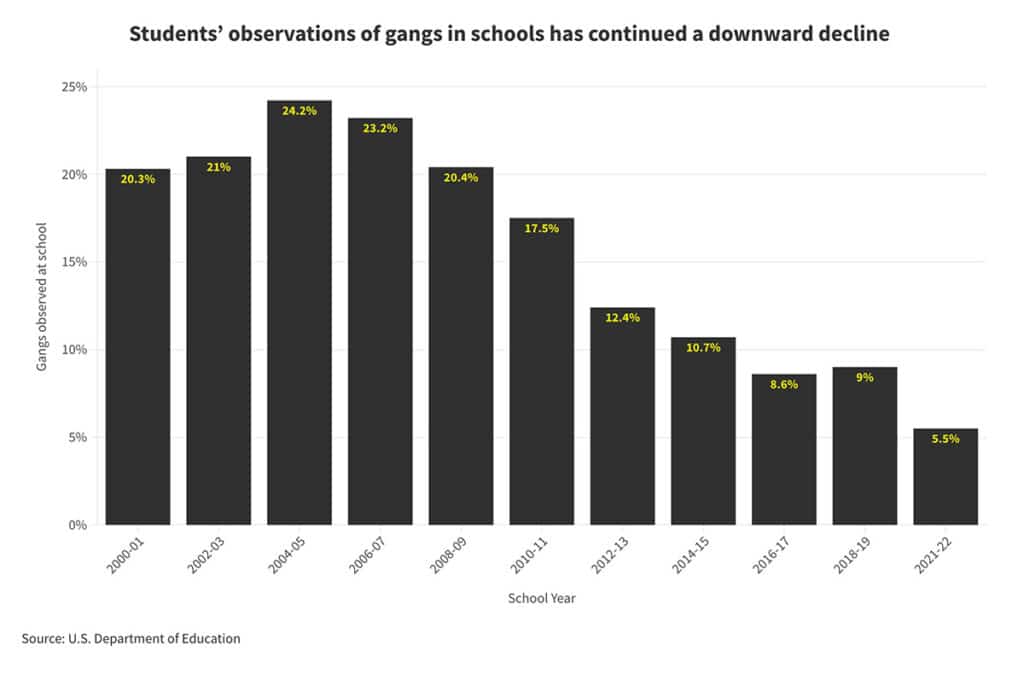
Another trend has been the expansion of free meals in school. The number of American kids now in schools that offer free meals has increased tenfold since 2010, to 21 million.
Free community college: This year, Massachusetts became the 20th state to offer tuition-free community college regardless of age, income, or GPA. Tennessee was the first to pioneer this approach in 2017, and it has spread rapidly since then in both blue and red states. Data shows it boosts enrollment rates.
Labor
Time off with baby: Almost all American corporations—96 percent—now offer maternity leave. A decade ago, only about half did. Ninety-three percent now offer paternity leave.
Minimum wage: Minimum wage increases went into effect in 22 states this year, and Alaska and Missouri voted in November to increase their minimum wage to $15 per hour. The landscape has changed dramatically and quickly: per Oxfam, 13 percent of US workers now earn under $15 per hour, down from nearly 32 percent in 2022. (So much progress has been made that the advocacy group Fight for 15 changed its name this year to Fight for a Union.)
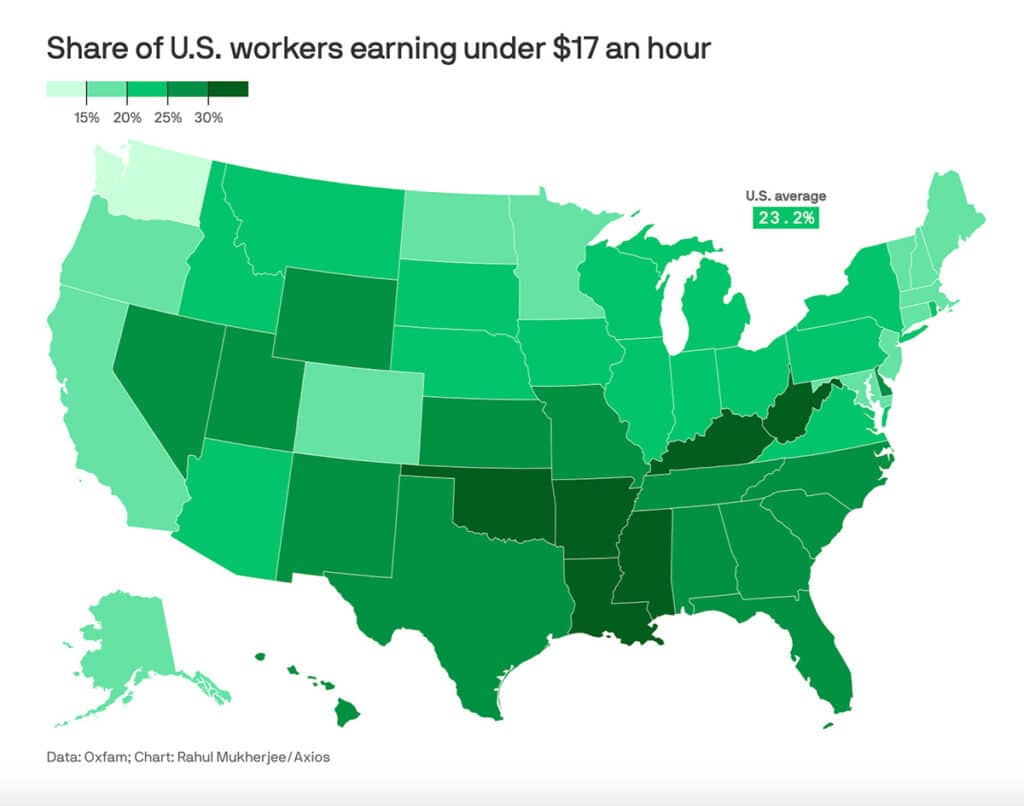
Paid sick leave: Alaska, Missouri, and Nebraska passed ballot measures in November to require paid sick leave. They will join 18 other states and Washington, DC.
Manufacturing is back: Private sector investment in US manufacturing has nearly doubled, to almost $200 billion, since the passage of the Inflation Reduction Act and the CHIPS and Science Act. These funds have reinvigorated job growth in many of America’s “left behind” communities.
Crime
Low violent crime: The country’s violent crime rate decreased by 4.4 percent in 2024, according to figures from the US Department of Justice. Murder in particular plunged, in major cities as much as 18 percent.
The surge in ghost guns being used in crimes has abated in some states and major cities, following new regulations passed by the Biden administration in 2021 that re-categorized do-it-yourself gun kits as regular firearms requiring a license, background check, serial number, and so on.
Gun violence overall is also down year on year, with shooting deaths falling 12 percent, injuries down 13 percent, and mass shootings declining 24 percent, according to data from the Gun Violence Archive.
Maine, New York, Vermont, California, Colorado, Massachusetts, New Mexico, Michigan, Washington, and Maryland, as well as several local districts, all passed new gun safety laws. The Trace has a year-end roundup with more information here.
Prison reform: Youth incarceration declined 75 percent between 2000 and 2022, from 108,800 youths held in juvenile justice facilities to 27,600. Youth offending is primarily non-violent. (Data released in 2024.)
There have also been a host of criminal justice reform laws passed in the past two years across red and blue states. They are too long to list, but you can find out more information about them here. Overall, nationwide incarceration rates have dropped by more than 25 percent between 2010 and 2020.
Americans are developing less punitive attitudes toward crime generally, and policies have changed as a result. Support for the death penalty, for instance, has fallen 13 percentage points since 2000.
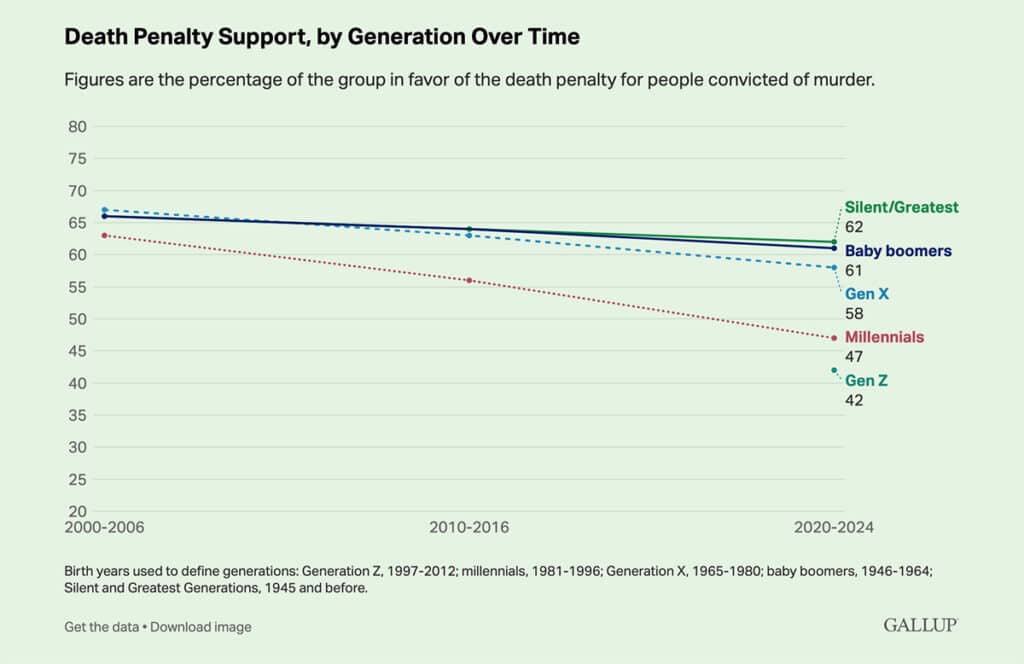
Environment
100% renewables: In June, Vermont passed a law mandating 100 percent renewable energy by 2035 for all utilities. Twenty-five states and Washington, DC have implemented renewable energy or net-zero emissions targets.
Meanwhile, the brisk renewable energy expansion continues. The US Energy Information Administration forecasts that solar power generation will grow 75 percent from 2023 to 2025, and wind power generation 11 percent. Renewable energy generation has already surpassed nuclear and coal, although natural gas remains the largest generator of electricity in the US, and is also growing.
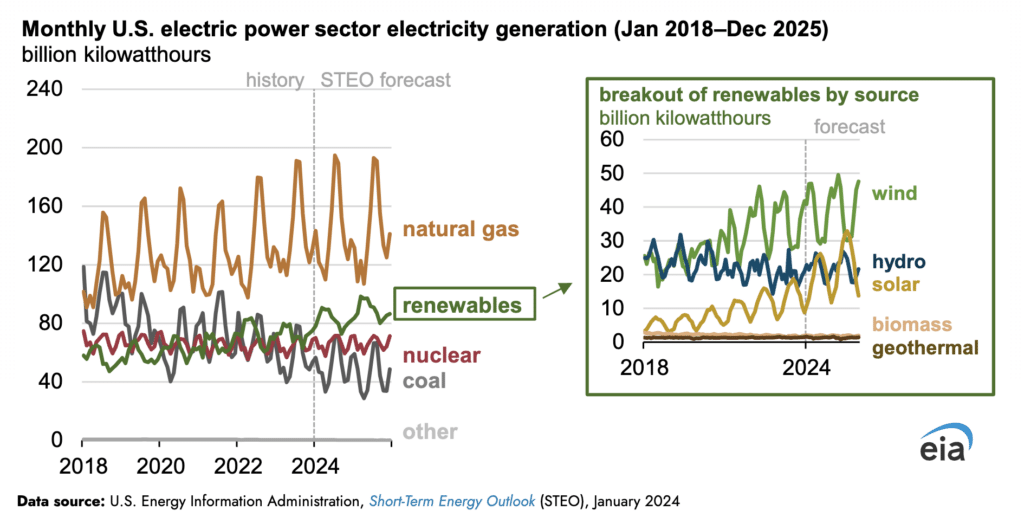
In November, several state and local ballot initiatives for climate and conservation were passed.
Rights
LGBTQ: Kentucky became the 24th state to ban conversion therapy, which tries to change a person’s sexual orientation or gender identity, for minors.
No child brides: Virginia became the 12th state, and the first in the South, to raise the legal age of marriage to 18. The vast majority of minors who marry under 18 in the US are married to adult men, before these girls are even old enough to consent to sex.
Last but not least, in 2024, America got its first battery-powered tugboat.

Know of progress made in your town, state, or region this year? Send it to hello@theprogressnetwork.org, and we’ll include it in next week’s edition.
Correction: A previous version of this newsletter used an incorrect graph to display renewable energy growth in the United States. It has been replaced.
By the Numbers
400,000: The number of male registered nurses in the US in 2023, up from 140,000 in 2000. This represents about 14 percent of all nurses in the country. (WSJ $)
79%: The drop in AIDS deaths in India since 2010.
742: The number of new species discovered in the Congo Basin between 2013 and 2023.
Quick Hits
🦠 The government of Mali has introduced the human papillomavirus (HPV) vaccine into its routine immunization program, offering the jab for free to up to 320,000 girls. Read last week’s newsletter edition for why this is such a big deal.
🦟 For the first time, a malaria vaccine is being rolled out in Nigeria, which has more deaths from the illness than any other country in the world.
🔬 Our World in Data researcher Saloni Dattani lists five breakthrough medical treatments of 2024 backed by advanced-stage research: lenacapavir, an injection that prevents HIV; omalizumab, an injection that helps people tolerate allergens; xanomeline-trospium, a new drug for schizophrenia; tirzepatide, a similar drug to the weight-loss drug semaglutide; and osimertinib, which extends the lifespan of people with a certain kind of lung cancer.
🙅 New Zealand, one of the handful of countries where greyhound racing is still permitted, will ban it in 2026, due to high rates of injuries and deaths among the dogs. The wind-down of the industry is beginning now, however, with the rehoming of thousands of dogs.
🐷 Mexico has written animal rights into its Constitution, giving the federal government power to issue laws on animal welfare and protection. Previously, animal welfare was left up to local and state authorities. The constitutional reforms also include farmed animals, which are usually excepted in animal welfare laws.
🐦⬛ Hawaiian crows, extinct in the wild since 2002, were successfully reintroduced into a forest reserve in Maui after previous attempts failed. The bird is one of only two corvid species known to use twigs to search for food and is sacred in Hawaiian culture.
🇧🇧 Barbados has completed the world’s first debt swap for climate resilience, a deal that will generate around $125 million to go toward sewage treatment plant upgrades that will boost water supply and cut down on pollution leaking into the Caribbean.
⚡ The Pope has got a new ride: an all-electric popemobile, a modified G-class vehicle gifted by Mercedes-Benz. It’s the first time that the carmaker, which has been providing vehicles for the Vatican for 90 years, has opted for an electric version.
👀 What we’re watching: Romania canceled its presidential election amid signs of Russian interference. What’s going on?
💡 Editor’s pick: “Brain rot” was first introduced as a term by Henry David Thoreau in his 1854 classic Walden. It’s now Oxford University Press’ word of the year.
TPN Member Originals
(Who are our Members? Get to know them.)
- The UnitedHealthcare CEO shooting | Tangle | Isaac Saul
- Biosecurity in the Trump era | IFP | Alec Stapp
- SCOTUS hears case on treatments for trans minors | Tangle | Isaac Saul
- Revenge of the crypto bros | The Edgy Optimist | Zachary Karabell
- Unburden yourself of secret shame and feel happier | The Atlantic ($) | Arthur C. Brooks
- What Republicans and Democrats get wrong about crime | NYT ($) | Jennifer Doleac
- Is Bluesky just as bad as Twitter? | Nonzero | Robert Wright
- Who are you calling ‘you guys’? Everyone, actually | NYT ($) | John McWhorter
- Identity politics won’t save us | Slow Boring | Matthew Yglesias
 The case for Trump’s tariffs | GZERO | Ian Bremmer
The case for Trump’s tariffs | GZERO | Ian Bremmer


